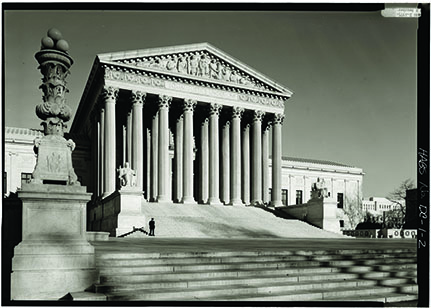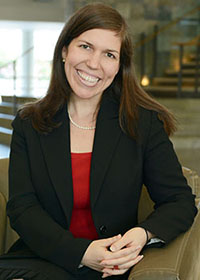Arkansas Scholar Analyzing Supreme Court Arguments on Same-Sex Marriage

University of Arkansas law professor is monitoring the U.S. Supreme Court in its process of deciding the legality of same-sex marriage.
FAYETTEVILLE, Ark. – University of Arkansas law professor Danielle Weatherby, whose research focuses on the First Amendment and emerging legal protections for transgender individuals, is monitoring the U.S. Supreme Court in its process of deciding the legality of same-sex marriage. Justices heard oral arguments Tuesday and are expected to make a decision sometime in June.
Weatherby noted that it is difficult to predict what the Court will decide, but said indicators can be found in the dialogue and progression of questions posed by the justices.
Relying on a transcript and recording of the oral arguments, including justices’ questions for attorneys on both sides of the case, Weatherby quickly wrote a summary and preliminary analysis of what she described as a “fascinating” session.
The Supreme Court is considering two questions: Does the U.S. Constitution require states to issue marriage licenses to same-sex couples, and must states recognize same-sex marriages performed in other states where they are legal?
 |
|
Danielle Weatherby, University of Arkansas |
Weatherby’s report underscores the justices’ typical gravity in their approach to the issues brought before the court. On the first question, she said, all justices, with the exception of Justice Clarence Thomas, asked the representing attorneys about the institution of marriage, the way in which marriage bans affect equal protection of the law for gays and lesbians, and whether the fundamental right to marry includes same-sex marriage.
“All of these questions have been at the core of the hotly debated issues litigated in the state and federal courts,” Weatherby said.
Many of the justices’ questions focused on the traditional notion of marriage and its historical and even anthropological definition as a union between one man and one woman. However, 82-year-old Justice Ruth Bader Ginsburg, whose comments during the session have already been recognized as placing the issue within the context of strengthening and expanding civil rights in the United States, emphasized the shift in marital dynamics over time from a dominant-subordinate relationship, in which the husband made all the important decisions, to a modern, egalitarian relationship.
“You wouldn’t be asking for this relief if the law of marriage was what it was a millennium ago?” Bader rhetorically asked one of the plaintiffs’ attorneys.
Justice Scalia expressed concern that the court’s decision could conceivably force ministers, who object to same-sex marriage for religious reasons, to perform such marriage ceremonies. Plaintiff’s lawyers and Justice Sonia Sotomayor quickly rebuffed Scalia’s concern, noting ministerial exceptions and the First Amendment’s Free Exercise Clause as protections for the clergy.
Weatherby pointed to one interesting development that could indicate the direction the court might take on the first question. During the hour-long discussion on the second question – whether states must recognize same-sex marriages performed in other states – Justice Anthony Kennedy, whom many believe is the swing vote in a closely divided court, asked only one question. Weatherby said his silence could indicate that he believes the Supreme Court will decide affirmatively on the first question – that the Constitution indeed protects same-sex couples and requires states to issue marriage licenses to them – which would essentially make the second question moot.
Nationwide, in addition to the cases currently before the U.S. Supreme Court, there are seven same-sex marriage cases pending in the various levels of state and federal courts. Two of these cases originated in Arkansas, one of which has reached the Arkansas Supreme Court and the other the Eighth Circuit U.S. Court of Appeals in St. Louis.
Weatherby has followed these cases throughout their trial and appellate phases. She said the Supreme Court’s decision will affect the two Arkansas same-sex marriage cases. If the Supreme Court decides yes on the first question and determines that states must recognize same-sex marriage, both the state case currently pending in the Arkansas Supreme Court and the federal case before the Eighth Circuit Court of Appeals will become moot, she said.
However, if the plaintiffs in the Supreme Court case either lose or prevail on only some of the issues, questions of state law could remain.
“In this case,” Weatherby said, “because it is the supreme authority on state law, the Arkansas Supreme Court may ultimately have to speak on the issue of same-sex marriage.”
About the University of Arkansas: The University of Arkansas provides an internationally competitive education for undergraduate and graduate students in more than 200 academic programs. The university contributes new knowledge, economic development, basic and applied research, and creative activity while also providing service to academic and professional disciplines. The Carnegie Foundation classifies the University of Arkansas among only 2 percent of universities in America that have the highest level of research activity. U.S. News & World Report ranks the University of Arkansas among its top American public research universities. Founded in 1871, the University of Arkansas comprises 10 colleges and schools and maintains a low student-to-faculty ratio that promotes personal attention and close mentoring.
Contacts
Danielle Weatherby, assistant professor
School of Law
479-575-7959,
dweath@uark.edu
Matt McGowan, science and research communications officer
University Relations
479-575-4246,
dmcgowa@uark.edu
Headlines
PetSmart CEO J.K. Symancyk to Speak at Walton College Commencement
J.K. Symancyk is an alumnus of the Sam M. Walton College of Business and serves on the Dean’s Executive Advisory Board.
Faulkner Center, Arkansas PBS Partner to Screen Documentary 'Gospel'
The Faulkner Performing Arts Center will host a screening of Gospel, a documentary exploring the origin of Black spirituality through sermon and song, in partnership with Arkansas PBS at 7:30 p.m. Thursday, May 2.
UAPD Officers Mills and Edwards Honored With New Roles
Veterans of the U of A Police Department, Matt Mills has been promoted to assistant chief, and Crandall Edwards has been promoted to administrative captain.
Community Design Center's Greenway Urbanism Project Wins LIV Hospitality Design Award
"Greenway Urbanism" is one of six urban strategies proposed under the Framework Plan for Cherokee Village, a project that received funding through an Our Town grant from the National Endowment for the Arts.
Spring Bike Drive Refurbishes Old Bikes for New Students
All donated bikes will be given to Pedal It Forward, a local nonprofit that will refurbish your bike and return it to the U of A campus to be gifted to a student in need. Hundreds of students have already benefited.




